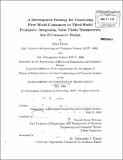A development strategy for connecting first-world consumers to third-world producers : integrating value chain transparency into E-commerce design
Author(s)
Dossa, Zahir (Zahir A.)
DownloadFull printable version (9.685Mb)
Alternative title
Integrating value chain transparency into E-commerce design
Other Contributors
Massachusetts Institute of Technology. Dept. of Electrical Engineering and Computer Science.
Advisor
Patrick Henry Winston.
Terms of use
Metadata
Show full item recordAbstract
Value chain transparency, such as publishing member biographies and profit distribution, can be a powerful tool in increasing consumer trust and consumer loyalty. This thesis provides a methodology for integrating value chain transparency into Ecommerce site design and makes preliminary findings of the positive influence this strategy has on consumer buying behavior. The design and implementation of integrating value chain information within an E-commerce site is demonstrated through the development of theargantree.com. The Argan Tree is a cooperative of 18 women based in southwestern Morocco who produce argan oil. theargantree.com connects these producers to consumers in the U.S. to sell this oil for its culinary and cosmetic benefits. The implications of this study can transform the cooperative landscape, which is often marked by low wages, a lack of accountability, and difficulty competing in high-end markets. By equipping these organizations with the Internet-based strategies proposed, cooperatives can overcome these challenges and serve as organizations capable of real poverty-alleviation. While the direct application of this thesis is aimed at producer cooperatives of under-privileged populations, the underlying theories and findings can support any retail organization.
Description
Thesis (M. Eng.)--Massachusetts Institute of Technology, Dept. of Electrical Engineering and Computer Science, 2010. Cataloged from PDF version of thesis. Includes bibliographical references (p. 75-76).
Date issued
2010Department
Massachusetts Institute of Technology. Department of Electrical Engineering and Computer SciencePublisher
Massachusetts Institute of Technology
Keywords
Electrical Engineering and Computer Science.